They met for 30 seconds - she then stalked him for four years
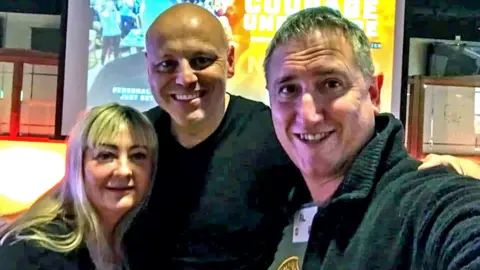 Alan Price
Alan PriceThe meeting between motivational speaker Brad Burton and Sam Wall lasted less than a minute. She posed for a picture with him after attending one of his workshops and later left a glowing video testimonial.
It was unremarkable, Mr Burton says. "Just one of the thousands of people I must have met over the years."
Two years later, she started attacking him online.
In hundreds of posts, Wall described him as manipulative, a psychopath and a sociopathic abuser. Day after day, she accused him of making death threats, breaking her windows and killing her cat - all false allegations.
"She put it on social media across all platforms. She was painting a picture that, somewhere along the way, I had done all these things and I was trying to cover it up," Mr Burton tells BBC Panorama.
"How do you prove a negative? That I had not poisoned the cat? Social media and the way it works, it's guilty until proven innocent."
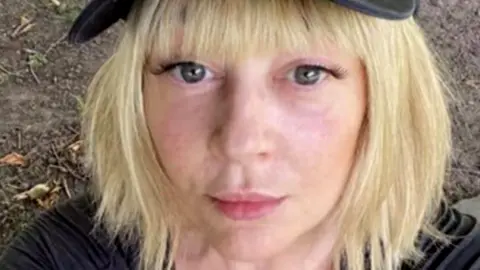 Instagram
InstagramWall, 55, a social media consultant, pleaded guilty to charges of stalking and sending false messages at Manchester Magistrates' Court last November.
Her sentencing was delayed for a second time last week, but the judge told her to expect a prison sentence.
Wall's legal team said a psychiatric report shows she has a chronic delusional mental health illness.
Her conviction was in relation to two victims - Mr Burton and businesswoman Naomi Timperley - who were targeted with abusive messages over the past four years.
"It's just been hideous, really hideous, and I don't know why it happened," Mrs Timperley tells us. "I'm still really anxious, sometimes I get really sad."
BBC Panorama has spoken to other victims who say they were stalked by Wall over a period of more than 10 years.
Some had never met Wall, while others only knew her as a passing acquaintance.
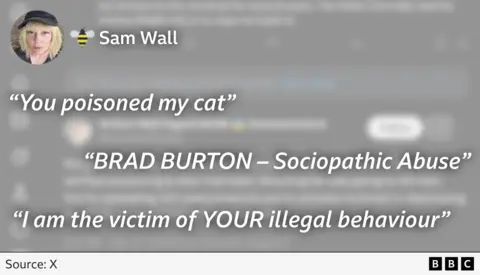
At the time Wall targeted Mr Burton, he was running a network supporting hundreds of small businesses across the UK.
Many of her abusive posts were detailed - one was 20,000 words long. Some were shared on LinkedIn, where she had 30,000 followers - the very platform Mr Burton relied on to promote his work.
While the pandemic hit him hard, he says she helped to sink his business.
Wall also falsely claimed that Mr Burton had in fact been harassing her for 10 years - and that he had been arrested and jailed.
Mr Burton posted pictures of himself online to prove he was not in prison. Wall responded by claiming his psychopathic twin was taking the photos and appearing at events to cover up the fact he had been locked up.
His friend Alan Price knew Wall was lying about the 10-year claim, because he had introduced them at the workshop two years earlier.
"She's telling everybody that Brad Burton is in jail, but I was actually out in Burnham-on-Sea in Somerset having a curry with him," he says.
In an attempt to stop her, Mr Burton went to a solicitor who advised him to send a cease and desist letter. Wall then responded by publishing the letter online and saying he could sue her - but she had no money.
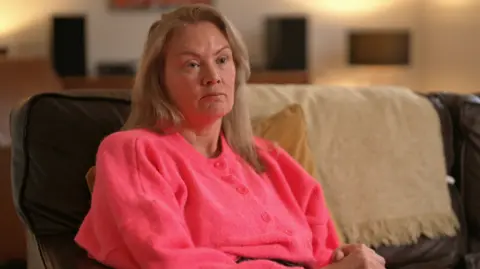
Mrs Timperley had only met Wall in passing - she followed her on Twitter and they were connected on LinkedIn. She was also targeted with hundreds of messages - accused of criminal damage, destroying Wall's business and of joining up with others to carry out so-called gang stalking.
Wall also falsely claimed Mrs Timperley had been arrested for harassment.
"I've been personally attacked on Instagram, Twitter, LinkedIn and Facebook and accused of really vile things," she tells us.
Wall continued her online attacks even after she had been charged with stalking.
Manchester-based entrepreneur Justine Wright was targeted over a decade. She had employed Wall for a couple of months and, when Wall left, the online stalking began.
Ms Wright is a marketing consultant and Wall repeatedly targeted her clients - major companies - with false claims. Justine had never met Brad, but Wall accused her of conspiring with him to poison her cat.
People might be surprised by the number of victims and that Wall did not disguise her identity, says Rory Innes, chief executive of the Cyber Helpline, a charity that helps victims of online crime.
But he says this is common.
"It's a horrendous case and she will be causing harm to lots of people and changing their lives. But this is happening to hundreds of thousands of people every year."
Panorama has spoken to other victims who do not want to be identified. One says he was stalked for more than a decade, during which time Wall sent thousands of texts, plus 10,000-word emails to his friends and business contacts.
Wall would also turn up at his work pretending to be his wife, he says, and accusing him of domestic abuse.
All of the victims complained to the social media companies about Wall's posts, but they have not been taken down.
Social media lawyer Paul Tweed tells Panorama he was not surprised the companies had failed to help.
"They decide what should be taken down, they decide when it should be taken down and how it should be taken down. And they will say, when you ask them, that they comply with the law," he says.
LinkedIn says it can't comment on individual users, but it does not allow bullying or harassment and it will take action against anything that violates its policies. Instagram, Facebook and X did not respond to Panorama's request for comment.
None of the companies have taken down Wall's abusive messages, even though Panorama told them about Wall's conviction two months ago.
Last week, she posted another abusive message about Mr Burton.
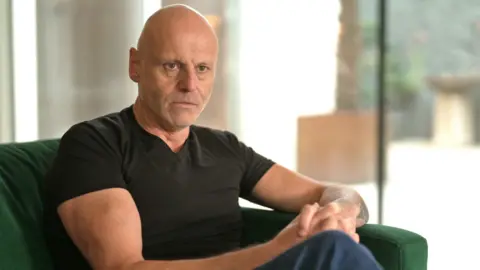
The charity Cyber Helpline has estimated that 600,000 people report online stalking to the police every year. Another charity, the Suzy Lamplugh Trust, says fewer than 2% of stalking and harassment complaints end with a conviction.
A major review by policing bodies last year found a lack of understanding of online stalking and evidence of the police failing to take it seriously.
The advice to victims of online stalking is basic - don't engage, keep records and report it to the police. But the people Panorama spoke to did that, and the abuse continued.
Mr Burton and and Mrs Timperley were unhappy with the response they got from Greater Manchester Police (GMP).
Outcomes for victims are really poor, Roy Innes from the Cyber Helpline says.
"So few of these cases actually end up with an investigation," he says. "And when an investigation does happen, the technology element can mean it takes years to get to the point where the evidence is being looked at."
A spokesperson for GMP says delays in the wider criminal justice system affected Wall's case and the force achieved positive outcomes for more than 3,000 victims of this type of crime last year.
We approached Wall for comment, but she did not respond.
Meanwhile, Mr Burton says he forgives her. "I hope she gets the help that she needs and she finds peace in her own life," he says.
